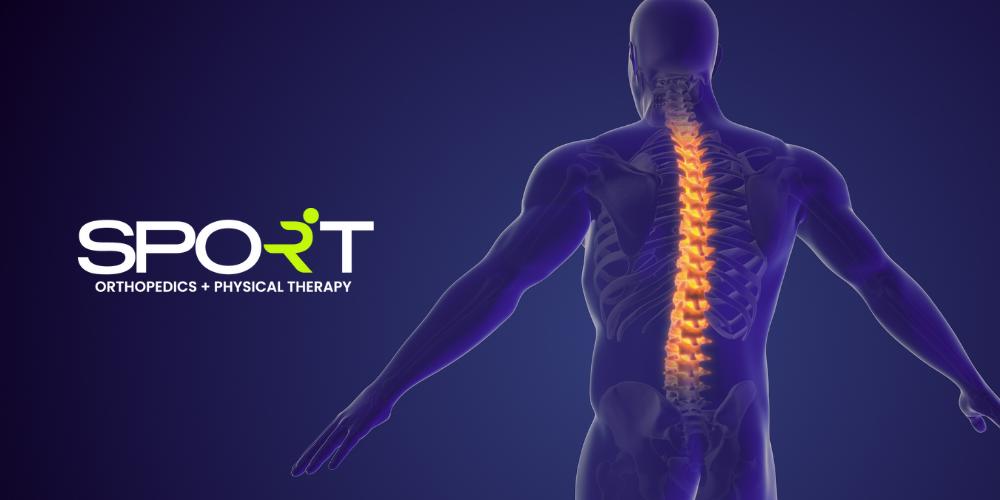
Have you ever suffered from back pain and wondered, “Why does my upper back hurt when I breathe?” Understanding upper back discomfort requires years of study and practice due to its varied causes. To resolve it, start by understanding your anatomy. Upper back pain can result from fixable issues or indicate serious problems.
Visit a Dallas orthopedic specialist to determine your condition. At SPORT Orthopedics + Physical Therapy, we offer orthopedic treatments and physical therapy in Dallas to help you get back to your activities. Call 469-200-2832 or fill out our online form to schedule an appointment.

Generally, upper back pain comes from injuries to the soft tissue, such as muscle strains or sprains. Poor posture or looking downward for long lengths of time also causes muscle tension in the area, which leads to pain. Unfortunately, back pain is extremely common for many people holding many different types of jobs. The following list includes common activities and behaviors that often lead to upper back pain.
Especially in older patients, this list elongates even more. Specifically, we look for signs of osteoporosis, compression fractures, or conditions such as multiple myeloma or lymphoma. However, thoracic spine (upper middle spine) issues aren’t relegated to the elderly population. While younger patients often experience a simple strain, we often examine patients to rule out the following problems.
Upper back pain while breathing can stem from various causes like infections, injuries, or heart issues, warranting medical attention if the cause is unclear. Such discomfort may signal significant health problems and could indicate pleurisy, a heart attack, a broken vertebra, or muscular strain.
Difficulty breathing alongside upper back pain should prompt a doctor's visit due to potential serious underlying issues. Shallow breathing can lead to oxygen deprivation, impacting long-term health. Below, we list the most common issues leading to upper back pain when breathing.
Interscapular discomfort, often called shoulder blade pain, has various causes, with muscular strain being common. However, it could also indicate serious conditions like a heart attack or lung cancer. Identifying the underlying cause is crucial as pain serves as a warning sign.
Pain between the shoulder blades can originate from structures around them or from distant areas, known as "referred pain." Some of the causes of pain in between shoulder blades include the following.

Is back or neck discomfort a symptom of anything more serious? Absolutely. While back discomfort is common and typically harmless and self-limiting, some signs and symptoms may suggest a more serious medical issue that needs further assessment and treatment. We’ve compiled a list of red flags to keep in mind while assessing the severity of your back pain.
If you experience any of the above symptoms along with your back pain, seek immediate medical attention.

Upper back pain when breathing can stem from various orthopedic causes. Some of the most common orthopedic conditions that can cause upper back pain when breathing include the following.
Herniated discs in the thoracic spine, the upper back region, can compress nerves and lead to pain that worsens with breathing movements.
Osteoarthritis, a degenerative joint disease, can affect the joints between the vertebrae, resulting in inflammation and discomfort, especially during breathing.
Muscle injuries, such as strains or sprains, can occur due to sudden movements, overexertion, or trauma, leading to localized pain exacerbated by breathing.
Poor posture, including slouching or hunching over, can strain the muscles and ligaments in the upper back, causing pain that may intensify with breathing.
Improper lifting or carrying of heavy objects can strain the muscles and ligaments in the upper back, leading to acute or sudden pain aggravated by breathing.
Repetitive motion injuries from activities like lifting, reaching, or twisting can cause strain and inflammation in the upper back muscles, resulting in pain exacerbated by breathing.
In severe cases, spinal fractures can also cause upper back pain when breathing. Spinal fractures, although less common in the upper back, can occur due to trauma or osteoporosis, leading to severe pain that may worsen with breathing movements.
Scoliosis, an abnormal curvature of the spine, can cause asymmetrical strain on the muscles and joints of the upper back, resulting in discomfort that may be exacerbated by breathing efforts.

Understanding how back pain is characterized might help you figure out what to do about it. The majority of back pain patients fall into one of two categories: acute or chronic.
If your back pain is severe, it’s likely that it started suddenly. Acute back pain can be caused by a variety of factors, including stress, intense activity, an uncomfortable movement, or moving something incorrectly. The majority of back pain is classified as acute.
The discomfort from acute back pain usually lasts no more than six weeks. And, in the vast majority of cases, the underlying source of the pain isn’t a significant or long-term issue.
On the other hand, chronic back discomfort can be harmful. Chronic pain is dangerous because the symptoms are severe enough to have a long-term impact on your health, mobility, and quality of life.
Back problems can strike abruptly, but it generally develops over time and lasts longer than six weeks. Chronic back pain can also be recurring, meaning that it will go away for a while then return on a regular basis.
A fresh injury can produce chronic pain, but the true reason is generally underlying problems. One of the most prevalent causes is muscle deconditioning (when your back lacks strength and stability).
Acute and chronic pain can have very similar symptoms. The following are some of the signs and common symptoms of back pain.

If back pain persists for over two weeks without relief, seeking medical help is advisable, whether it's chronic or acute. Starting with physical therapy can provide tailored strengthening and mobility routines.
Acute pain often resolves within weeks, but chronic pain typically requires medical intervention, as home remedies offer only temporary relief without addressing underlying causes. When surgery is considered, choosing the right surgeon is crucial. For information on whether you should choose a neurosurgeon vs orthopedic surgeon, read our related blog.
When you feel upper back pain when breathing, it can be confusing and frustrating. Work with your doctor to figure out what’s causing your pain, which might be one of the following.
Back discomfort may affect anybody, even toddlers and teenagers. These variables may increase your chances of experiencing back discomfort.
By improving your physical condition and understanding and practicing appropriate body mechanics, you may be able to avoid or prevent back discomfort. Keep the following in mind to maintain a healthy back.

Your back will be examined, and your ability to take deep breaths, sit, stand, walk, and lift your legs will be assessed. Your doctor may also ask you to score your pain on a scale of one to ten and discuss how well you’re managing your discomfort.
These tests can reveal the source of your discomfort, how much you can move before pain causes you to stop, and whether you have muscular spasms. They can also aid in the elimination of more severe causes of back pain.
If your doctor suspects a specific ailment is causing your back discomfort, he or she may request one or more of the following tests.
The majority of back pain improves after a month of home therapy. Back pain, on the other hand, is a complicated problem that affects everyone differently. Many people’s discomfort lasts a few months, but only a few people experience chronic, severe pain. You may just require over-the-counter pain medications and the use of heat. Bed rest is not advised.
Continue your activities to the extent that you are able. Light exercise, such as walking and daily activities, are good options. Stop doing things that make you hurt, but don’t stop doing things because you’re afraid of getting hurt. If home remedies fail after a few weeks, your doctor may prescribe stronger medicines or other treatments.
You can even use heat therapy or cold therapy depending on your specific needs. If you’re wondering “Is heat or ice better for back pain?”, we answer that question in our related blog.
Exercises to promote flexibility, strengthen your back and abdominal muscles, and improve your posture can be taught by a physical therapist. The practice of these strategies on a regular basis can help prevent discomfort from recurring. Physical therapists will also educate you on how to alter your motions during a back pain episode to minimize flare-ups of pain while staying active.

At SPORT Orthopedics + Physical Therapy, our specialists handle a variety of problems and conditions resulting from a variety of causes. If you’re looking to treat your injuries and get back to your active lifestyle, we’re here for you. Our skilled orthopedic specialists and physical therapists will work with you to achieve as fast and comfortable a recovery as possible. For more information or to schedule an appointment, please call 469-200-2832 today.







*We accept most all insurance plans, if you do not see your plan listed above or have any questions, please contact our office.

SPORT Orthopedics + Physical
Therapy – Dallas, TX
Services:
• Clinic • Orthopedic • Urgent Care
• Physical Therapy
18152 Preston Road
Suite I-2
Dallas, TX 75252
Phone: (469) 200-2832
Fax: (469) 269-1074
SPORT Orthopedics + Physical Therapy
– Frisco, TX
Services:
• Clinic • Orthopedic • Urgent Care
• Physical Therapy
9255 Dallas Parkway
Suite I20
Frisco, TX 75033
Phone: (469) 200-2832
Fax: (469) 269-1074
SPORT Orthopedics + Physical
Therapy – Wylie, TX
Services:
• Clinic • Orthopedic • Urgent Care
• Physical Therapy
3400 FM 544
Suite 650
Wylie, TX 75098
Phone: (469) 200-2832
Fax: (469) 269-1074
SPORT Physical
Therapy – Prosper, TX
Services:
• Physical Therapy
790 N Preston Rd
Suite 60
Prosper, TX 75078
Phone: (469) 200-2832
Fax: (469) 269-1074
SPORT Orthopedics – Mesquite, TX
Services:
• Clinic
• Orthopedic
• Urgent Care
1102 North Galloway Ave
Mesquite, TX 75149
Phone: (469) 200-2832
Fax: (469) 269-1074
Due to the high volume of calls, we want to inform all patients and providers that our phones are only active during our open hours of 8:30 AM – 5:00 PM. The lines will not ring outside of these business hours or during our lunch break from 12:00 PM to 1:30 PM. For faster assistance, please text us at 469-200-2832. If you need to schedule an appointment, the most efficient method is to book online on this website.